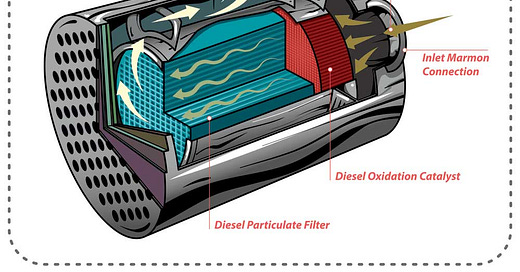Its not hard to do it.
Cars that have engines that will blow up, or transmissions that will do so, inside of 50 or 100,000 miles.
DPFs that have 100,000 mile service lives -- and cost $3,000 or more to replace even though they're service items on diesel trucks because the manufacturer decided to place it inside the catalytic converter housing and make removing and replacing it extremely expensive and difficult as a result, instead of being a 30 minute job to unbolt two flanges and replace it in for under $1,000.
Homes with crap appliances and ****ty components that break within 2-3 years -- or even worse, crap framing and foundations.
Phones with batteries that have 300-500 cycle life expectations -- and must be charged daily -- but the batteries are not replaceable by the user.
And so on.
Just one legal change will stop it entirely in major purchases. No, it won't stop it everywhere and it is everywhere but it will stop it in the things that drive up your cost of living to huge degrees -- including vehicles, communications and housing.
Its a one-sentence bill:
No entity may offer financing, irrespective of the means or indirection, for a term that extends beyond the 100%, parts and labor warranty coverage, allowing only an exclusion for physical abuse or damage by accident or malice.
An uncovered failure during the financing period terminates the entirety of the rest of the payment obligation in full, irrespective of the percentage of the remaining contract or the amount of the denied claim.
Enforcement is via the FTC as an unfair and deceptive business practice and any entity attempting collection via any means commits felony fraud upon the consumer and is liable for three times the harm done, including but not limited to reputational damage should credit reports be impacted or collection attempts made with statutory minimum damages of $10,000 per consumer so-harmed due to the dunned person which is collectable via suit in small claims with no capacity to remove it to the District or State court systems.
That's it.
Yes, this applies to financed used car sales as well.
You can sell all the en****ified things you'd like -- but only for cash.
Now the manufacturer or builder has to cut the bull**** and make products with a warranty that is all-inclusive, parts and labor including all components without exception, except for physical damage due to Act of God, accident, proved neglect or malicious act.
If they don't then the maximum financing term is effectively zero.
If a car company cannot build vehicles with 200,000 mile drivelines that do not explode before that time that's fine, but since there is no "miles or months" on this the first guy who has an eight year financing contract and drives 25,000 miles a year when his truck blows in year five the other half of his contract is void -- he only pays for half the truck.
You sell a new house with ****ty 10 year three-tab shingles? It can't be financed for more than ten years.
You sell cellphones with non-user-replaceable batteries? You can't finance them through "payment systems" for more than 12 months, which is the expected battery cycle life with one charge a day, or everyone who buys one on said two year agreement, when the battery fails after a year and you won't cover it, has their rest of their obligation voided.
And so on.
One simple law, no more than three paragraphs.
Implementation? Simple: A homebuilder must have posted surety against defects and failures during the mortgage period. They selected the components and labor so its on them and since no builder can self-insure that across their entire "as built" base for that length of time they'll have to buy said insurance against it. That's ok. A carmaker can choose the length of their end-to-end warranty coverage but whatever they choose, and no mileage limits either, is the limit on financing. A used car dealer must likewise offer same or only deal in cash.
A non-commercial seller (e.g. a private-party home sale) can take place but to get financing one of the parties is going to have to pony up for said coverage. Since financing on third-party sales of real estate is typically the buyer's election as to terms and duration that's now part of the transaction cost and yes, this will mean inspections actually mean something since they'll go into the price of said coverage which the buyer will, of course, deduct from his calculation of present value -- justly so. The only exception is of course bare land which has no such requirement since it can't "break" due to en****ification.
PS: No, you cannot sell burritos on Klarna. Anyone trying to do that gets no payment at all since the burrito is **** before the first payment is due -- quite literally ****.





While this seems just, right, and fair, I can't imagine the support and logistics required to make it function. And it seems this system may point us to a society with no warranties before it will relent and provide us more functional and durable products.
Businesses will howl.
Onward, Christian soldiers!
Why wasn't everything shit before?
Because people knew about the things they were buying.
The problem is that people became useless. Cars became bags of shit because people bought the shiny ones with touchscreens because they knew that fixing them wasn't going to be up to them so they didn't care what was going on under the hood. Same with houses, and houses aren't even complicated.
Your solution is to institute a system that further removes any necessity to know about the minutiae of your life. Just pay the money and the system will take care of it.
It won't be a surprise when such a system just gets exploited to screw everyone even further.